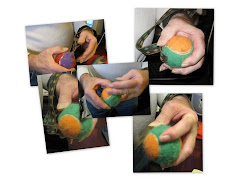 In recent years, I've been concentrating on my Green Tea intake because that's been the tea du jour. The ad man's darling. And certainly not without merit. Green tea has antioxidants which can possibly help PD by providing symptom relief or slowing progression. It has not been established that the green tea antioxidants are that readily available in tea form, however.
In recent years, I've been concentrating on my Green Tea intake because that's been the tea du jour. The ad man's darling. And certainly not without merit. Green tea has antioxidants which can possibly help PD by providing symptom relief or slowing progression. It has not been established that the green tea antioxidants are that readily available in tea form, however.About antioxidant threatment, there isn't enough research to be definitive. There were CoQ10 studies but they have been flawed. Even the current studies are deficient because they do not include high enough doses.
There is a clinical trial now in Phase 2 in Beijing to determine if Green Tea is an effective & safe treatment for new PD patients without taking any other meds. The jury is still out and certainly the processing is important which may be why the studies are taking place in China.
We know that another constituent of tea, caffeine, is effective in delaying the onset of Parkinson's. That has already been established. And even if caffeine won't prevent PD, we're all for delaying the start time There have been caffeine studies, especially the 30+ year Hawaiian study which demonstrated a delayed onset. Tea contains more caffeine than coffee - put down that tea pot - until you brew it when it dilutes to about 2/5 less than coffee.
Green tea is made in such a way that chemically it is similar to the fresh leaf. Black tea is not a breed apart but actually the green tea leaves of the Camellia sinensis which have been completely fermented resulting in a slight reduction of caffeine and a change from the simple catechins (polyphenols) to the more complex theaflavins, theanine, an amino acid unique to tea leaves, and thearubigins.
Back in 2007 researchers in China collected data on more than 60,000 men and women in a
 study in which they determined that the polyphenols in green tea had an antioxidant effect which might protect neurons from the damaging effects of reactive oxygen species and nitric oxide. This has great implications for neuromotor diseases such as Parkinson's.
study in which they determined that the polyphenols in green tea had an antioxidant effect which might protect neurons from the damaging effects of reactive oxygen species and nitric oxide. This has great implications for neuromotor diseases such as Parkinson's.EGCG, Epigallocatechin Gallate, a catechin which functions as an antioxidant in green tea, converts to theaflavins and thearubigins in black teas. These can cross the the blood brain barrier and have been demonstrated to be effective against dementia in aging and AIDS related dementia plaques in a petri dish. They are now being further studied for their effectiveness in neurodegenerative diseases such as PD, AD, and HIV dementia.
What else about the black tea? Black tea is green tea which only contains about 3-10% of the polyphenols compared to 30-40% in green tea. There was a black tea study in 2008 in which it was said essentially that black tea showed an "inverse association" with Parkinson's disease risk that was not contradicted by the total caffeine intake or tobacco smoking. In other words the disease risk is actually reduced. The claim was that drinking a minimum of 23 cups of black tea a month might slow onset of PD by up to 71%
Tetley, a subsidiary of Tata Tea Ltd, is not going to be making any claims yet - they are probably still smarting over getting into hot water with the UK Advertising Standards Authority for overstating antioxidant health benefit claims.
For those of you who like milk with your cream but are concerned because you know that milk proteins could prevent the absorption of the flavonoids in your tea no worries. A Dutch study conducted a few years ago in which the total consumption was about 8 cups of tea a day. It demonstrated that the flavonoid bioavailability was not significantly affected by a bit of milk in your tea.
There's more to study about the components of green and black tea but for now, I'll enjoy my green and my black tea with milk and I think we'll be sending some black tea to our children.
Addendum 3/2012: I have read that taking mucuna puriens (the natural levodopa) with Epigallocatechin Gallate, ECGC, helps aid the transport efficiency and effectiveness. We're ordering a green tea capsule high in EGCG to use with the curcuminoids and mucuna pruriens. We'll let you know. We'd like to lower the curcuminoid dosage as perhaps the MAOI side effects leave something to be desired.
Resources and Reading:
Green tea extracts may stop Parkinson's
Black tea may slash Parkinson's disease risk
Drinking Black Tea Reduces Risk of Parkinson's Disease
New Insights into Tea Ingredients
Theaflavins in Black Tea and Catechins in Green Tea Are Equally Effective Antioxidants
Tea Beverage
Steep it Loose
Destressing with L-theanine
A little help from Wikipedia:
Catechins
Thearubigin
Theanine














This was great info!! Wow I guess I will go back to drinking more tea!!Thanks so much for the great investigating! b'nana
ReplyDeleteThanks for the information. Black tea is indeed benefitial to health in many ways. It prevents diabetes, cancer, heart attack and many other disorders. Also it allows control fat deposition and cholesterol amounts.
ReplyDelete